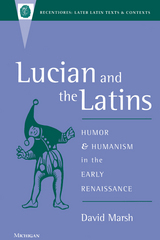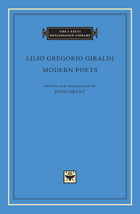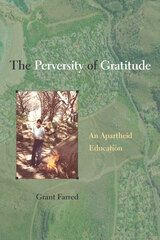
An innovative collection of comedic stories by the original “Renaissance man.”
Leon Battista Alberti (1404–1472) was among the most famous figures of the Italian Renaissance. His extraordinary range of abilities as a writer, architect, art theorist, and scientist made him the original model for the many-sided “Renaissance man.”
A collection of stories meant to be read while dining and drinking, the Dinner Pieces, or Intercenales, are one of Alberti’s most innovative and experimental works, mixing literary genres and styles of prose composition adapted from both Greek and Latin models. They cover a wide range of topics, from moral philosophy, politics, and religion to the arts, money-making, love and friendship, and the study of the humanities. The Dinner Pieces offer satiric commentary on the cultural illusions and moral myths of Alberti’s day. They cut through the absurdity of human existence with the blade of wit and laughter and constitute an important monument in the history of comic writing.
This English translation by David Marsh is based on the authoritative Latin text of Roberto Cardini, accompanied by ample notes.

An innovative collection of comedic stories by the original “Renaissance man.”
Leon Battista Alberti (1404–1472) was among the most famous figures of the Italian Renaissance. His extraordinary range of abilities as a writer, architect, art theorist, and scientist made him the original model for the many-sided “Renaissance man.”
A collection of stories meant to be read while dining and drinking, the Dinner Pieces, or Intercenales, are one of Alberti’s most innovative and experimental works, mixing literary genres and styles of prose composition adapted from both Greek and Latin models. They cover a wide range of topics, from moral philosophy, politics, and religion to the arts, money-making, love and friendship, and the study of the humanities. The Dinner Pieces offer satiric commentary on the cultural illusions and moral myths of Alberti’s day. They cut through the absurdity of human existence with the blade of wit and laughter and constitute an important monument in the history of comic writing.
This English translation by David Marsh is based on the authoritative Latin text of Roberto Cardini, accompanied by ample notes.

Until now, no study has attempted to connect the Latin translators and imitators of Lucian with his wider European influence. In Lucian and the Latins, David Marsh describes how Renaissance authors rediscovered the comic writings of Lucian. He traces how Lucianic themes and structures made an essential contribution to European literature beginning with a survey of Latin translations and imitations, which gave new direction to European letters in the fifteenth and sixteenth centuries. The Lucianic dialogues of the dead and dialogues of the gods were immensely popular, despite the religious backlash of the sixteenth century. The paradoxical encomium, represented by Lucian's "The Fly" and "The Parasite," inspired so-called serious humanists like Leonardo Bruni and Guarino of Verona. Lucian's "True Story" initiated the genre of the fantastic journey, which enjoyed considerable popularity during the Renaissance age of discovery. Humanist descendants of this work include Thomas More's Utopia and much of Rabelais' Pantagruel.
Lucian and the Latins will attract readers interested in a wide variety of subjects: the classical tradition, the early Italian Renaissance, the origins of modern European literature, and the uses of humor and satire as instruments of cultural critique.
David Marsh is Professor of Italian, Rutgers University.

Born in Ferrara, Lilio Gregorio Giraldi (1479–1552) received an excellent classical education at the world-famous humanist schools of his native city. On his various travels in search of a patron, he visited Naples, frequenting the Academy there; Mirandola, where he entered the service of Gianfrancesco Pico; Milan, where he studied Greek under Demetrius Chalcondyles; and Rome, where he enjoyed the munificence of Pope Leo X. Following the sack of Rome in 1527, Giraldi eventually made his way back to Ferrara, where he spent the last years of his life.
Giraldi was the author of many works on literary history, mythology, and antiquities. Among the most famous are his dialogues, translated here into English for the first time. Modeled on Cicero’s Brutus, the work discusses hundreds of contemporary neo-Latin and vernacular poets, giving a panoramic view of European poetry in the late fifteenth and early sixteenth century from Great Britain to Greece, but concentrating above all on Italy.

Solomon and Marcolf is known for being both important and mysterious. It pits wise Solomon, famous from the Bible, against a wily peasant named Marcolf. One of its two parts is a dialogue, in which the king and jester, sage and fool, prophet and blasphemer bandy back and forth questions and comments. Whereas Solomon is solemn and pompous, Marcolf resorts to low language and earthy topics. The other part comprises twenty short chapters in which Marcolf tricks Solomon time and again. These episodes are as impudent and scatological as is the dialogue. Together, the two parts constitute a rudimental prose novel or “rogue biography.”
Cited by Bakhtin in Rabelais and His World, Solomon and Marcolf is widely known by name. But until now it has not been translated into any modern language. The present volume offers an introduction, followed by the Latin and English, detailed commentary, and reproductions of woodcut illustrations from the 1514 edition. Appendixes help readers understand the origins and influence of a work that was composed around 1200, that attained its greatest popularity in the fifteenth and sixteenth centuries, and that has the potential still today to delight and instruct.
READERS
Browse our collection.
PUBLISHERS
See BiblioVault's publisher services.
STUDENT SERVICES
Files for college accessibility offices.
UChicago Accessibility Resources
home | accessibility | search | about | contact us
BiblioVault ® 2001 - 2024
The University of Chicago Press









